
- Afrikaans Grade 8
- Creative Arts Grade 8
- Dance studies Grade 8
- Dramatic Arts Grade 8
- EMS Grade 8
- English Grade 8
- Geography Grade 8
- Grade 8 Natural Science
- IsiZulu Grade 8
- IsiNdebele Grade 8
- Free Teaching Resources
- Universities
- Public Colleges
- Private Colleges
- N6 Question Papers and Memorandums with Study Guides
- N5 Question Papers and Memorandums with Study Guides
- N4 Question Papers and Memorandums with Study Guides
- N3 Question Papers and Memorandums with Study Guides
- N2 Question Papers and Memorandums with Study Guides
- N1 Question Papers and Memorandums with Study Guides
- Latest Updates
- Learning Content

Things Fall Apart Essay Questions and Notes for Grade 11
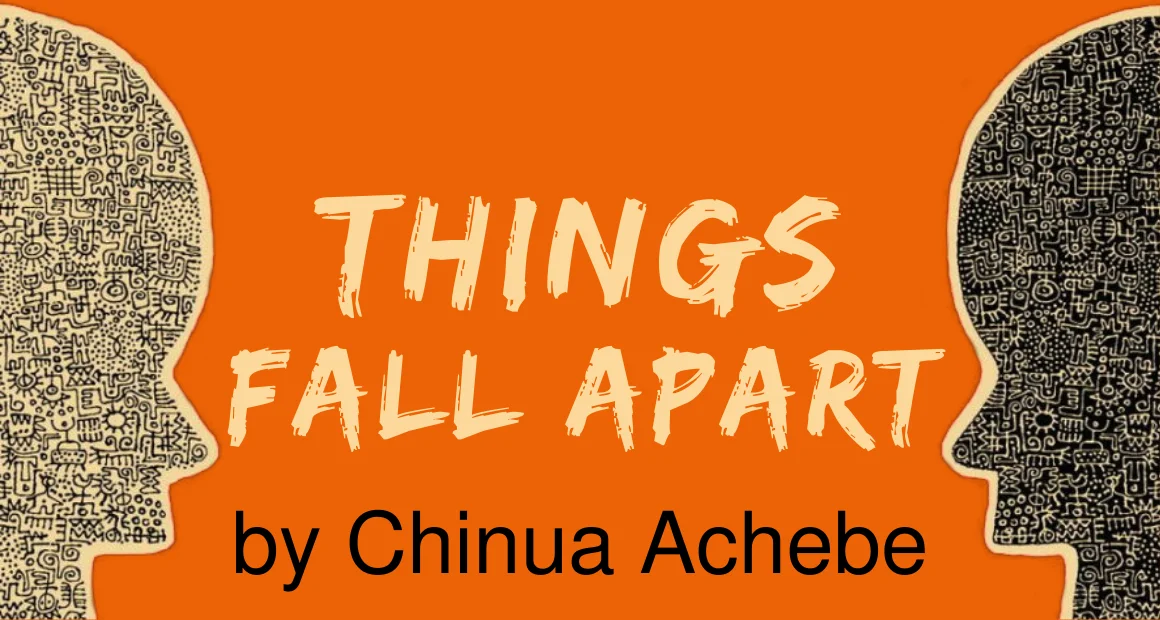
Things Fall Apart Essay Questions and Notes for Grade 11:
Questions and Answers
Essay question:.
Question 1:
In a carefully planned essay of 350–400 words (11⁄2–2 pages) in length, critically discuss to what extent the title of the novel is reflected in Okonkwo’s life and the lives of the villagers.
Short Question:
Question 2:
Read the extracts below and then answer the questions that follow:
Okonkwo’s prosperity was visible in his household. He had a large compound enclosed by a thick wall of red earth. His own hut, or obi, stood immediately behind the only gate in the red walls. Each of his three wives had her own hut, which together formed a half moon behind the obi. The barn was built against one end of the red walls, and long stacks of yam stood out prosperously in it. At the opposite end of the compound was a shed for the goats, and each wife built a small attachment to her hut for the hens. Near the barn was a small house, the ‘medicine house’ or shrine where Okonkwo kept the wooden symbols of his personal god and of his ancestral spirits. He worshipped them with sacrifices of kola nut, food and palm-wine, and offered prayers to them on behalf of himself, his three wives and eight children.
So when the daughter of Umuofia was killed in Mbaino, Ikemefuna came into Okonkwo’s household. When Okonkwo brought him home that day he called his most senior wife and handed him over to her.
‘He belongs to the clan,’ he told her. ‘So look after him.’
‘Is he staying long with us?’ she asked.
‘Do what you are told, woman,’ Okonkwo thundered, and stammered, ‘When did you become one of the ndichie of Umuofia?’
And so Nwoye’s mother took Ikemefuna to her hut and asked no more questions.
As for the boy himself, he was terribly afraid. He could not understand what was happening to him or what he had done. How could he know that his father had taken a hand in killing a daughter of Umuofia? All he knew was that a few men had arrived at their house, conversing with his father in low tones, and at the end he had been taken out and handed over to a stranger. His mother had wept bitterly, but he had been too surprised to weep. And so the stranger had brought him, and a girl, a long, long way from home, through lonely forest paths. He did not know who the girl was, and he never saw her again.
- Briefly relate how Okonkwo’s visible prosperity (line 1) is the result of his upbringing and single-mindedness.
- Describe Okonkwo’s character as it is revealed in lines 1–11.
- Explain why Ikemefuna was brought to Okonkwo’s household.
- Refer to lines 15–19. What do you understand about the relationship between Okonkwo and his most senior wife (line 14)? (3)
- Ikemefuna could not understand what was happening to him or what he had done (lines 20–21). To what extent does Ikemefuna’s bewilderment reflect the way in which Okonkwo expects his wife to accept his decision? (3)
- Explain how the lonely forest paths (line 26) that Ikemefuna walks on his way to Umuofia are an ominous sign.
Watch: Things Fall Apart | Essay Topic Breakdown
Things Fall Apart Book Summary
Things Fall Apart is set in a fictional group of Igbo villages called Umuofia, around the beginning of the twentieth century. The first half of the novel is dedicated to an almost anthropological depiction of Igbo village life and culture through following the life of the protagonist Okonkwo. Okonkwo is the greatest wrestler and warrior alive in the nine villages and beyond. He has dedicated his life to achieving status and proving his strength to avoid becoming like his father Unoka – a lazy, improvident, but gentle man. Weakness is Okonkwo’s greatest fear. After men in another village kill a woman from Umuofia, a boy named Ikemefuna is given to Umuofia as compensation and lives in Okonkwo’s compound until the Gods decide his fate. Ikemefuna quickly becomes part of Okonkwo’s family; he is like a brother to Okonkwo’s son Nwoye and is secretly loved by Okonkwo as well. Over the next three years, the novel follows Okonkwo’s family through harvest seasons, religious festivals, cultural rituals, and domestic disputes. Okonkwo is shown to be more aggressive than other Igbo men and is continually criticized and rebuked by the village for his violence and temper. When the Oracle of the Hills and Caves decides that Ikemefuna must be killed, Okonkwo is warned by a respected elder to have no hand in the boy’s death because Ikemefuna calls him ‘father’. However, afraid of being thought weak, when Ikemefuna runs to Okonkwo in hope of protection, Okonkwo delivers the fatal blow. Ikemefuna’s brutal death deeply distresses Nwoye who becomes afraid of his father.
At the end of Part One, Okonkwo accidentally kills a clansman at a funeral after his faulty gun explodes and is exiled to his motherland, Mbanta. During his exile, British missionaries arrive in Mbanta and establish a church. Nwoye, disillusioned with his own culture and Gods after Ikemefuna’s death, is attracted to Christianity and is an early convert. This is a heartbreaking disappointment to Okonkwo. When Okonkwo and his family return from exile after seven years they find that the missionaries and colonial governors have established Umuofia as the center of their new colonial government. Clashes of culture and morality occur, and as the British make the Igbo more dependent on them through introducing trade and formal education, the Igbo way of life is continually undermined. When a Christian convert unmasks an egwugwu during a tribal ritual, a sin amounting to the death of an ancestral spirit, the egwugwu burn down the village church. The men who destroyed the church are arrested and humiliated by the District Commissioner, and Okonkwo beheads a court messenger at a village council in rebellion. When none of his clansmen rise with him against the British, Okonkwo realizes his culture and way of life is lost and commits suicide in despair. Suicide is a crime against the Earth Goddess, Ani , so Okonkwo is left to rot above ground in the Evil Forest, like his father Unoka – a shameful fate he spent his life desperate to avoid. The final paragraph, written from the perspective of the District Commissioner, reduces Okonkwo’s life to a single sentence about his death in his planned book The Pacification of the Primitive Tribes of The Lower Niger . Achebe has filled an entire novel with evidence of the complexity and sophistication of Okonkwo’s individual and social life and the District Commissioner’s casual dismissal and belittling of him causes us to flinch with horror and dismay. This is a metaphor for the reduction of Igbo culture in the eyes of its colonizers.
The title gives away the plot of the novel and anticipates the collapse of Okonkwo and his society. Things Fall Apart is about the connection between the tragic downfall of Okonkwo, who fate and temperamental weakness combine to destroy, and the destruction of his culture and society as the Igbo way of life is assailed by forces they do not understand and are unprepared to face.
Things Fall Apart Character Analysis
Okonkwo is a man who values masculinity, strength, and respect above all else. He is seen as a leader within his clan and his family, which includes three wives and a number of children. A man of action, Okonkwo overcomes his poor background and achieves great success. Unoka, Okonkwo’s father, was lazy and a poor provider, and Okonkwo is driven to be everything his father was not. Okonkwo’s rigidity causes great harm, first within his family—the killing of Ikemefuna and the rift with Nwoye—and then within society. Okonkwo is unable to adapt when the white man/missionaries come to his village. He commits suicide rather than adhere to the rules of the changed society.
Unoka is viewed by Okonkwo and the clan as lazy, although he was also a gifted musician and a gentle man. Rather than working, Unoka preferred to play his flute and drink wine. He was seen as a coward because he was afraid of war. He had poor harvests because he was unwilling to put in the effort to care for the land. When Unoka died, he was in debt to all of his neighbors.Okonkwo cannot see his father’s good qualities and hates him. He lives his life with the intention of avoiding anything his father enjoyed.
Ikemefuna comes to the clan as a form of payment for a murder that one of his tribesmen committed. The elders place Ikemefuna with Okonkwo, who puts his first wife in charge of the boy. Ikemefuna misses his family but comes to feel at home in Umuofia. He becomes popular within the family, particularly with Okonkwo’s oldest son, Nwoye. Okonkwo is also fond of Ikemefuna, though he does not reveal his feelings and eventually participates in Ikemefuna’s murder.
Nwoye seems to have adopted some of Unoka’s traits, which upsets Okonkwo. Okonkwo worries that Nwoye will grow up behaving as his grandfather behaved. Because of his concern, Okonkwo is even harder on Nwoye and beats him regularly. Nwoye begins to change under the influence of Ikemefuna. When Ikemefuna is killed, Nwoye retreats into himself and is cut off from his father. With the arrival of the missionaries, Nwoye revives. He breaks away from his father and becomes a Christian convert.
Ekwefi is Okonkwo’s second wife. Ekwefi was attracted to Okonkwo when she saw him defeat Amalinze the Cat in wrestling. She could not marry him because he was too poor. After he achieves success, she leaves her husband and goes to Okonkwo, who takes her in with no questions. She is particularly close with her only child, Ezinma. After losing nine children, Ekwefi was a broken woman. When Ezinma lived beyond infancy, Ekwefi rejoiced. She treats her daughter more like an equal than a child. The loss of children has also created a connection to Okonkwo, who accepts behaviors from her that he does not from his other wives. He shows her more care and concern.
Ezinma is the only child of Okonkwo’s second wife, Ekwefi. She is particularly close to her mother. Okonkwo also favors Ezinma. He feels a connection to her and appreciates her boldness. Her behaviors and attitude make Okonkwo wish she were a boy. Ezinma feels a similar fondness for her father.
Obierika is the closest thing Okonkwo has to a confidant. Like Okonkwo, he has achieved status within the clan. He has multiple wives and children. He marries off one daughter, and his son is a wrestling champion. When Okonkwo is forced to leave Umuofia, Obierika cares for his land and property.Unlike Okonkwo, Obierika is more nuanced in his thinking and is able to express himself. He rebukes Okonkwo for participating in the murder of Ikemefuna, tells him to have patience with his children, and cautions him about the power of the missionaries. When Okonkwo dies, Obierika speaks up on his behalf and calls him a great man.
https://www.sparknotes.com/lit/things/a-plus-essay/
https://www.vcestudyguides.com/blog/things-fall-apart
Related Posts

The Child Who Was Shot Dead by Soldiers at Nyanga: Poem Analysis and Notes PDF
The Child Who was Shot Dead by Soldiers at Nyanga: Poem Analysis and Notes PDF The child who was shot dead by soldiers at...

English Home Language Grade 11 Exams past papers and memos Term 4 November 2020
English Home Language Grade 11 Exams past papers and memos Term 4 November 2020 pdf download My Courses has a large collection of grade...
Featured English Home Language Grade 11 November 2022 Exam Question Papers and Memos
Find all term 4 English Home Language Grade 11 November 2022 Exam Question Papers and Memos Paper 1+Paper 2+Paper 3. These past papers will...
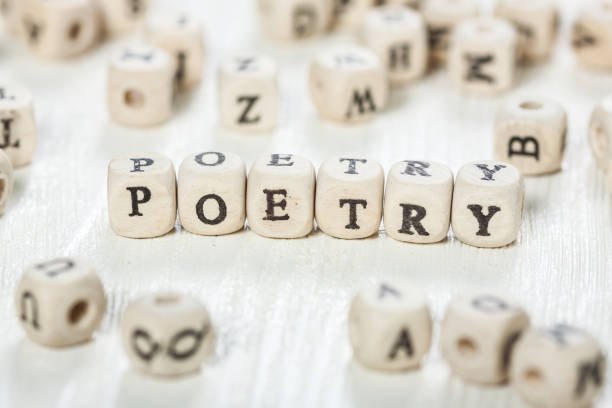
Grade 11 Poetry Questions and Answers
Welcome to our dedicated page for Grade 11 English Paper 2 Poetry Questions and Answers. Here, students and educators alike will find a valuable...
English Home Language Grade 11 June 2023 exam question papers with the memorandums pdf download
English Home Language Grade 11 June 2023 exam question papers with the memorandums pdf download. For Grade 11 learners, English Home Language Grade 11...
Featured English First Additional Language Grade 11 November 2022 Exam Question Papers and Memos
Find all term 4 English First Additional Language Grade 11 November 2022 Exam Question Papers and Memos Paper 1+Paper 2+Paper 3. These past papers...
Previous Story
A more flexible curriculum approach can support student success
Life sciences grade 12 september 2023 question paper and memo pdf.

Things Fall Apart
Chinua achebe, ask litcharts ai: the answer to your questions.
Welcome to the LitCharts study guide on Chinua Achebe's Things Fall Apart . Created by the original team behind SparkNotes, LitCharts are the world's best literature guides.
Things Fall Apart: Introduction
Things fall apart: plot summary, things fall apart: detailed summary & analysis, things fall apart: themes, things fall apart: quotes, things fall apart: characters, things fall apart: symbols, things fall apart: theme wheel, brief biography of chinua achebe.
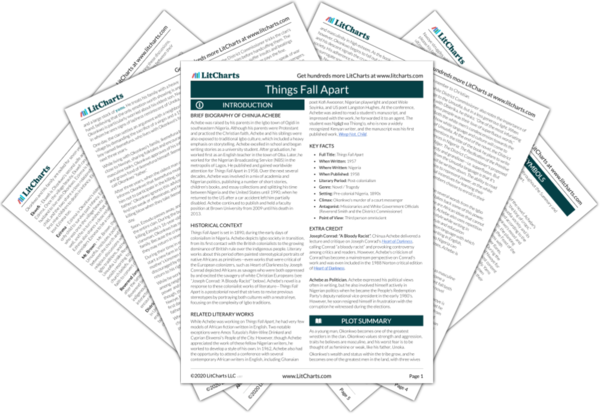
Historical Context of Things Fall Apart
Other books related to things fall apart.
- Full Title: Things Fall Apart
- When Written: 1957
- Where Written: Nigeria
- When Published: 1958
- Literary Period: Post-colonialism
- Genre: Novel / Tragedy
- Setting: Pre-colonial Nigeria, 1890s
- Climax: Okonkwo's murder of a court messenger
- Antagonist: Missionaries and White Government Officials (Reverend Smith and the District Commissioner)
- Point of View: Third person omniscient
Extra Credit for Things Fall Apart
Joseph Conrad: “A Bloody Racist”. Chinua Achebe delivered a lecture and critique on Joseph Conrad's Heart of Darkness , calling Conrad “a bloody racist” and provoking controversy among critics and readers. However, Achebe's criticism of Conrad has become a mainstream perspective on Conrad's work and was even included in the 1988 Norton critical edition of Heart of Darkness .
Achebe as Politician. Achebe expressed his political views often in writing, but he also involved himself actively in Nigerian politics when he became the People's Redemption Party's deputy national vice-president in the early 1980's. However, he soon resigned himself in frustration with the corruption he witnessed during the elections.

ELA / 11th Grade / Unit 2: Things Fall Apart
Things Fall Apart
Students read Chinua Achebe's widely acclaimed Things Fall Apart as they examine themes of identity, culture, and colonialism, analyzing the author's careful choice of words and symbolism.
- Text and Materials
Key Knowledge
Unit summary.
Chinua Achebe, often called the father of modern African literature, has had an impact on readers around the world and on a generation of novelists who have come behind him. His tragic novel, Things Fall Apart , is one of the most widely-read books in the world. The novel’s message about colonialism is echoed and built upon by many of the non-European authors students will read throughout 11th and 12th grade English .
In this unit, students will examine how Achebe develops the complex themes of identity, culture and colonialism, and the individual and community throughout the novel. They will analyze his craft by looking deeply at character development, word choices, and symbols, examining how the author uses these devices to comment on the devastating impact of European colonialism on the culture and peoples of Africa. Along with the novel, students will read several articles and poems that will help to deepen their understanding of the author, the text, and the themes. They will be required to show their deep understanding of both the content and skills of the unit through a mid-unit essay and a unit test.
Texts and Materials
Some of the links below are Amazon affiliate links. This means that if you click and make a purchase, we receive a small portion of the proceeds, which supports our non-profit mission.
Core Materials
Book: Things Fall Apart by Chinua Achebe (Penguin Books, 2017)
Supporting Materials
Excerpt: Igbo Culture and History by Don C. Ohadike
Book: Heart of Darkness by Joseph Conrad
Book: Purple Hibiscus by Chimamanda Ngozi Adichie (Algonquin Books, 2012)
Poem: “Mango Seedling” by Chinua Achebe
Poem: “The Second Coming” by William Butler Yeats
Article: “Chinua Achebe, African Literary Titan, Dies at 82” by Jonathan Kandell (New York Times, 2013)
Article: “How to Write about Africa” by Binyavanga Wainaina (Granta, 2006)
Speech: “An Image of Africa: Racism in Conrad’s 'Heart of Darkness'” by Chinua Achebe
This assessment accompanies Unit 2 and should be given on the suggested assessment day or after completing the unit.
Download Content Assessment
Download Content Assessment Answer Key
Intellectual Prep
Suggestions for how to prepare to teach this unit
- Read and annotate the novel.
- Take the final exam, including writing the essay.
- Read all of the supporting texts for this unit.
Build Background Knowledge
- A suggested article to build your background knowledge on Chinua Achebe is "After Empire" by Ruth Franklin (The New Yorker)
Essential Questions
The central thematic questions addressed in the unit or across units
- Identity: In what ways are human beings similar across culture? In what ways does culture impact identity?
- The Individual and Community: What is community? What holds it together? What tears it apart? What is the relationship between the individual and community? Why is maintaining balance in this relationship so important?
- Culture and Colonialism: What is the impact of European colonialism on the characters in the novel? On the people and cultures of Africa?
Writing Focus Areas
Specific skills to focus on when giving feedback on writing assignments
Spiraling Literary Analysis Writing Focus Area
- Developing a unique thesis statement to convey an idea about a text
- Selecting the most relevant pieces of text to support an argument
- Explaining accurately how the evidence supports the argument
Related Teacher Tools:
Grades 9-12 Composition Writing Rubric
Literary terms, text-based vocabulary, idioms and word parts to be taught with the text
Literary Terms
proverb, epigraph, theme, characterization, character motivation, conflict, mood, setting, tone, juxtaposition, foil, perspective, point of view, irony, satire, tragedy, tragic or fatal flaw
Roots and Affixes
ora- (orator, oracle) and ex- (exile, expedient), im- (impenetrable, impotent)
chapter 1: plaintive (6), prowess (8, 38); chapter 2: amiss (9), discern (9), potent (11), capricious (13); chapter 4: benevolent (26), repentant (31), abomination (31); chapter 5: morality (36), subdue (42); chapter 6: frenzy (47), taut (48); chapter 7: harbinger (56), copiously (56); chapter 8: valor (65), succulent (71); chapter 9: malevolence (79), specious (80); chapter 10: trifle (94); chapter 11: impenetrably (95), benumbed (107); chapter 12: prominent (119); chapter 13: lamentation (12), inadvertent (124), calamity (125); chapter 14: requisite (130); exile (133); chapter 15: fugitive (138), harbinger (139), abomination (141); chapter 16: derisive (146), callow (147); chapter 17: fetish (149), miscreant (152), effeminate (153), annihilation (153); chapter 18: convert (154), heathen (157), ostracize (159); chapter 20: indignity (175), wrath (177); chapter 21: dispensation (178), zeal (178), prestige (182); chapter 21: desecrate (186, 190), imminent (188), pacified (191); chapter 23: palaver (193), ominous (196), sonorous (196); chapter 24: vengeance (199), valor (203); chapter 25: superfluous (206)
Idioms and Cultural References
Text: colonialism (for context), harmattan (1, 5), share-cropping (22)
There are a number of Igbo words and phrases used in the novel. Students should use the glossary at the back of the book for these Igbo words—they are italicized in the text.
Content Knowledge and Connections
Fishtank ELA units related to the content in this unit.
- European colonization of Africa
- Igbo culture
- Chinua Achebe as a writer and social commentator
Future Fishtank ELA Connections
- 12th Grade ELA - The God of Small Things
- Purple Hibiscus — p. 1
- Heart of Darkness — p. 8
- “Chinua Achebe, African Literary Titan, Dies at 82”
Infer Achebe’s purpose(s) for writing Things Fall Apart.
Gather basic information about the Igbo people and the impact of European colonization on the Igbo.
- “The Second Coming”
- Things Fall Apart pp. 3 – 8
Predict the major themes of the novel.
Analyze the author’s characterization of the protagonist, Okonkwo.
Analyze the continued characterization of Okonkwo in chapter 2.
Describe how the author uses setting, nonlinear plot, and characterization to develop theme.
- Things Fall Apart pp. 16 – 22 — Chapter 3
- “An Image of Africa: Racism in Conrad’s 'Heart of Darkness'”
Identify examples of techniques Achebe uses to counteract Europeans’ simplistic stereotypes of Africans.
Analyze Achebe’s portrayal of women in chapter 4.
Trace Achebe’s development of Okonkwo’s tragic flaw.
Students will analyze how Achebe further develops Okonkwo’s hyper masculinity as a fatal flaw in chapter 5.
Explain how the author establishes the significance of the wrestling match to the people of Umuofia.
Analyze Okonkwo’s decision to disobey the Oracle and how this decision develops theme.
Analyze Achebe’s use of Obierika as a foil for Okonkwo.
Analyze the importance of children to the lives of women in Umuofia.
Explain the role of the egwugwu in the Umuofian judicial system.
Analyze the role of women in Umuofian society.
Explain how Achebe develops the theme of the individual and community in chapter 11.
Craft an essay that answers the prompt.
Analyze how Achebe develops the importance of strong and harmonious ties to the Igbo community.
Explain the development of Okonkwo’s tragic flaw in chapter 13.
Trace the author’s continued development of the importance of strong harmonious ties within a community.
Analyze the shift in tone toward the missionaries over the course of chapter 16.
Analyze the symbolism of fire as it relates to Achebe’s characterization of Okonkwo’s relationships.
Analyze how Achebe develops both the theme of community and colonization in these chapters.
- Things Fall Apart — Chapter 20
- “Mango Seedling”
Analyze the disagreement between Okonkwo and Obierika, explaining how Achebe uses it to build theme.
Analyze Okonkwo’s reaction to his village and the village’s reaction to Okonkwo.
Students will be able to analyze how Achebe brings the conflict to a climax in these chapters.
Analyze how the author develops Okonkwo’s character in chapter 24.
- Things Fall Apart — Chapter 25
- “How to Write about Africa”
Analyze Achebe’s use of irony and narration to communicate theme at the end of the novel.
Review major themes and events of the text in order to review for tomorrow’s exam.
Create a free account to access thousands of lesson plans.
Already have an account? Sign In
Common Core Standards
Core standards.
The content standards covered in this unit
Language Standards
L.11-12.4 — Determine or clarify the meaning of unknown and multiple-meaning words and phrases based on grades 11—12 reading and content, choosing flexibly from a range of strategies.
L.11-12.5 — Demonstrate understanding of figurative language, word relationships, and nuances in word meanings.
L.11-12.6 — Acquire and use accurately general academic and domain-specific words and phrases, sufficient for reading, writing, speaking, and listening at the college and career readiness level; demonstrate independence in gathering vocabulary knowledge when considering a word or phrase important to comprehension or expression.
Reading Standards for Informational Text
RI.11-12.2 — Determine two or more central ideas of a text and analyze their development over the course of the text, including how they interact and build on one another to provide a complex analysis; provide an objective summary of the text.
RI.11-12.3 — Analyze a complex set of ideas or sequence of events and explain how specific individuals, ideas, or events interact and develop over the course of the text.
RI.11-12.6 — Determine an author's point of view or purpose in a text in which the rhetoric is particularly effective, analyzing how style and content contribute to the power, persuasiveness, or beauty of the text.
Reading Standards for Literature
RL.11-12.1 — Cite strong and thorough textual evidence to support analysis of what the text says explicitly as well as inferences drawn from the text, including determining where the text leaves matters uncertain.
RL.11-12.2 — Determine two or more themes or central ideas of a text and analyze their development over the course of the text, including how they interact and build on one another to produce a complex account; provide an objective summary of the text.
RL.11-12.3 — Analyze the impact of the author's choices regarding how to develop and relate elements of a story or drama (e.g., where a story is set, how the action is ordered, how the characters are introduced and developed).
RL.11-12.5 — Analyze how an author's choices concerning how to structure specific parts of a text (e.g., the choice of where to begin or end a story, the choice to provide a comedic or tragic resolution) contribute to its overall structure and meaning as well as its aesthetic impact.
RL.11-12.6 — Analyze a case in which grasping point of view requires distinguishing what is directly stated in a text from what is really meant (e.g., satire, sarcasm, irony, or understatement).
Speaking and Listening Standards
SL.11-12.1 — Initiate and participate effectively in a range of collaborative discussions (one-on-one, in groups, and teacher-led) with diverse partners on grades 11—12 topics, texts, and issues, building on others' ideas and expressing their own clearly and persuasively.
SL.11-12.2 — Integrate multiple sources of information presented in diverse formats and media (e.g., visually, quantitatively, orally) in order to make informed decisions and solve problems, evaluating the credibility and accuracy of each source and noting any discrepancies among the data.
SL.11-12.3 — Evaluate a speaker's point of view, reasoning, and use of evidence and rhetoric, assessing the stance, premises, links among ideas, word choice, points of emphasis, and tone used.
Writing Standards
W.11-12.1 — Write arguments to support claims in an analysis of substantive topics or texts, using valid reasoning and relevant and sufficient evidence.
W.11-12.9 — Draw evidence from literary or informational texts to support analysis, reflection, and research.
W.11-12.10 — Write routinely over extended time frames (time for research, reflection, and revision) and shorter time frames (a single sitting or a day or two) for a range of discipline-specific tasks, purposes, and audiences.
The Glass Menagerie
One Flew Over the Cuckoo's Nest
Request a Demo
See all of the features of Fishtank in action and begin the conversation about adoption.
Learn more about Fishtank Learning School Adoption.
Contact Information
School information, what courses are you interested in, are you interested in onboarding professional learning for your teachers and instructional leaders, any other information you would like to provide about your school.

Effective Instruction Made Easy
Access rigorous, relevant, and adaptable ELA lesson plans for free
- Arts & Humanities
- Shakespeare
Grade 11 English HL November 2014 P2
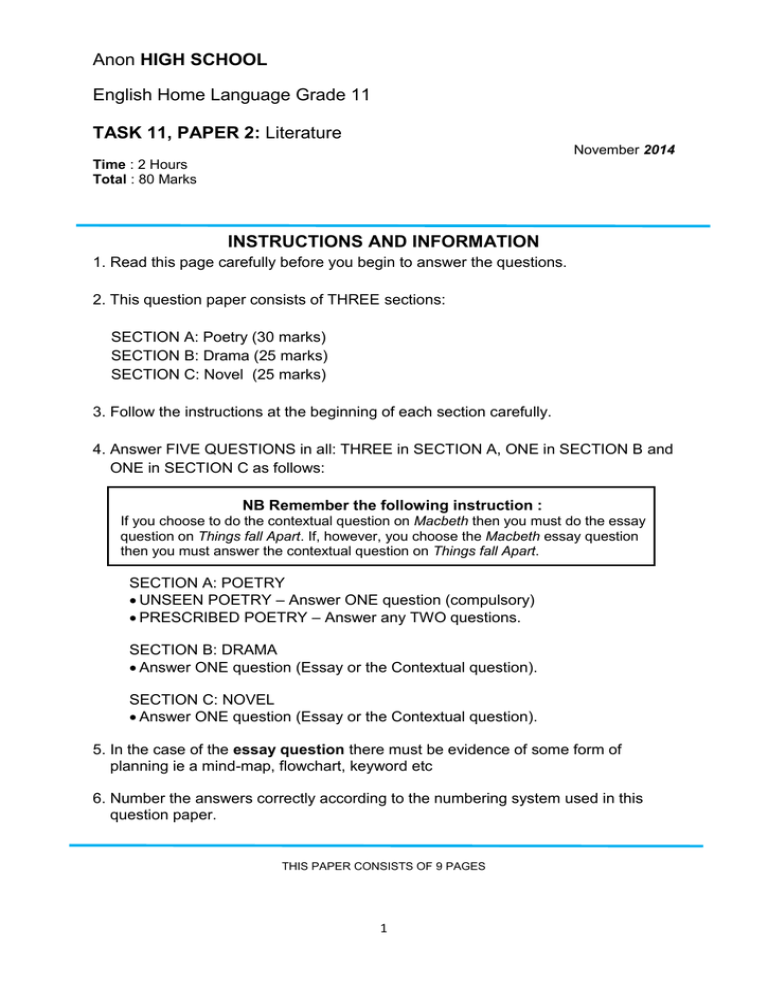
Related documents
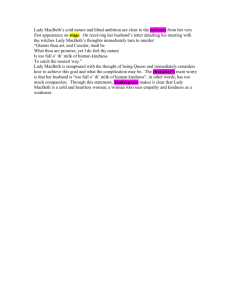

Add this document to collection(s)
You can add this document to your study collection(s)
Add this document to saved
You can add this document to your saved list
Suggest us how to improve StudyLib
(For complaints, use another form )
Input it if you want to receive answer
Home — Essay Samples — Literature — Books — Things Fall Apart
Essays on Things Fall Apart
Things fall apart essay topics and outline examples, essay title 1: the cultural clash in "things fall apart".
Thesis Statement: Chinua Achebe's "Things Fall Apart" explores the collision of Igbo traditional culture and European colonialism, illustrating the devastating consequences of cultural disintegration.
- Introduction
- Igbo Traditional Culture and Values
- The Arrival of European Colonists
- Conflicts and Changes in Igbo Society
- The Tragic Consequences of Cultural Clash
Essay Title 2: Character Analysis of Okonkwo in "Things Fall Apart"
Thesis Statement: Okonkwo, the protagonist of "Things Fall Apart," embodies both admirable and tragic qualities, making him a complex character whose fate reflects larger themes of the novel.
- Okonkwo's Early Life and Ambitions
- Strengths and Flaws of Okonkwo's Character
- Okonkwo's Struggles and Downfall
- Okonkwo's Role in the Novel's Themes
Essay Title 3: Gender Roles and Women's Power in "Things Fall Apart"
Thesis Statement: Achebe's "Things Fall Apart" challenges traditional gender roles within the Igbo society by portraying the strength, resilience, and influence of women, particularly through the character of Ezinma.
- Igbo Gender Roles and Expectations
- Ezinma as a Symbol of Female Empowerment
- Other Strong Female Characters in the Novel
- The Evolution of Gender Dynamics
Cultural Collision in Nwoye
Irony in things fall apart, made-to-order essay as fast as you need it.
Each essay is customized to cater to your unique preferences
+ experts online
Sharing Social Context a Literary Analysis
Things fall apart: change vs tradition, the portrayal of women in things fall apart, repression and tragedy in achebe’s things fall apart, let us write you an essay from scratch.
- 450+ experts on 30 subjects ready to help
- Custom essay delivered in as few as 3 hours
How Okonkwo’s Outward Conformity Hides His Personal Questioning in Things Fall Apart
The main aims of the author in "things fall apart", okonkwo's polarized concepts of femininity and masculinity in things fall apart, the importance of adapting to changes in "things fall apart" by chinua achebe, get a personalized essay in under 3 hours.
Expert-written essays crafted with your exact needs in mind
The Use of Proverbs in Things Fall Apart by Chinua Achebe
Achebe's goal to increase global comprehension of african culture through things fall apart, critique of the effect of western imperialism on the third world in things fall apart, the effects of colonialism on igbo society in things fall apart and the joys of motherhood, the allegory of the title things fall apart, tragic hero in "things fall apart": triumph and consequences, things fall apart and purple hibiscus: female sabotage in an african setting, the use of proverbs in chinua achebe’s novel, language as a bridge to understanding in things fall apart, a novel by chinua achebe, how chinua achebe uses settings in his "things fall apart", impacts of post-colonialism in things fall apart, surfacing, and fire on the mountain, things fall apart: sexism in the igbo culture, the importance of family in white teeth, disgrace and things fall apart, theme of parental conflict in purple hibiscus and things fall apart, evaluation of the role of okonkwo as illustrated in achebe's things fall apart, analysis of okonkwo as a tragic hero, comparison of "heart of darkness" and "things fall apart", the portrayals of imperialism in "things fall apart" and "heart of darkness", the use of ethos, logos and pathos in the book "things fall apart" by chinua achebe, comparative analysis of "heart of darkness" versus "things fall apart".
1958, Chinua Achebe
Novel; Allegorical, historical fiction
Ezinma, Nwoye, Ikemefuna, Okonkwo, Mr. Brown
The European invasion and earlier colonial accounts of African history.
Colonialism, culture, family, friendship, life, struggle, politics, a cultural clash, Igbo society
While the African culture is often ignored, this particular book speaks directly about life in the Igbo society. It also tells an insider story of the African experience that becomes clear for those people who are not directly involved. It tells about the spiritual history of African people and makes a cultural aspect that is often ignored even through the lens of colonial background.
This complex, yet profound novel tells us a story of Okonkwo, a wrestling champion belonging to the Igbo community. The novel takes place among the fictional clan where we learn about family life, history of the main character, custom, society, and the usual challenges. The third part of the book deals with the Christian missionaries and the European colonialism.
The title of the book has been taken from a poem called "The Second Coming", which has been penned by W.B. Yeats. Achebe's goal has been to let the readers learn more about the African society that has been dynamic and vivid, yet completely different from the Western society. The book shows Africa as a modern and well-developed society. The "Things Fall Apart" manuscript has been lost for months until it has finally been found for publishing. Achebe has been influenced by the style of Charles Dickens. The book has given a start for the African literature all over the world. Achebe's work has helped to break down numerous stereotypes about the African society and the tribes.
“The white man is very clever. He came quietly and peaceably with his religion. We were amused at his foolishness and allowed him to stay. Now he has won our brothers, and our clan can no longer act like one. He has put a knife on the things that held us together and we have fallen apart.” “A man who calls his kinsmen to a feast does not do so to save them from starving. They all have food in their own homes. When we gather together in the moonlit village ground it is not because of the moon. Every man can see it in his own compound. We come together because it is good for kinsmen to do so.” “If you don't like my story, write your own” “Then listen to me,' he said and cleared his throat. 'It's true that a child belongs to its father. But when a father beats his child, it seeks sympathy in its mother's hut. A man belongs to his fatherland when things are good and life is sweet. But when there is sorrow and bitterness he finds refuge in his motherland. Your mother is there to protect you. She is buried there. And that is why we say that mother is supreme. Is it right that you, Okonkwo, should bring your mother a heavy face and refuse to be comforted? Be careful or you may displease the dead. Your duty is to comfort your wives and children and take them back to your fatherland after seven years. But if you allow sorrow to weigh you down and kill you, they will all die in exile.” “Age was respected among his people, but achievement was revered. As the elders said, if a child washed his hands he could eat with kings.”
The most important lesson that this book brings and a reason why it is essential for us is the socio-cultural clash that takes place as the colonial times arrive. We are given an opportunity to compare the things that were usual for Igbo community and the changes that immediately took place, mostly against a person's will.
It is an important topic that helps us to write about the culture, society, our background, history, and the changes that we have to endure when the new changes come. The book is a great example of how the old friendships and tradition vs change instantly become broken when the cultural pressure comes up. It is also a great novel that tells us about our faith and the rule of power.
Okonkwo is an element or a symbol of peripeteia or a dramatic reversal. We can follow Okonkwo's path from being a man of respect to becoming an outcast in his tribe (clan). The tragedy of his death (suicide) is what represents the downfall.
1. Rhoads, D. A. (1993). Culture in Chinua Achebe's Things fall apart. https://www.cambridge.org/core/journals/african-studies-review/article/abs/culture-in-chinua-achebes-things-fall-apart/D123B160B650B9BE84E6E85ACF032B9A African Studies Review, 36(2), 61-72. 2. Caldwell, R. (2005). Things fall apart? Discourses on agency and change in organizations. Human relations, 58(1), 83-114. (https://journals.sagepub.com/doi/abs/10.1177/0018726705050937?journalCode=huma) 3. Ikuenobe, P. (2006). The idea of personhood in Chinua Achebe’s Things fall apart. Philosophia Africana, 9(2), 117-131. (https://www.pdcnet.org/philafricana/content/philafricana_2006_0009_0002_0117_0131) 4. Parmentier, M. A., & Fischer, E. (2015). Things fall apart: The dynamics of brand audience dissipation. Journal of Consumer Research, 41(5), 1228-1251. (https://academic.oup.com/jcr/article/41/5/1228/2962093) 5. Nnoromele, P. C. (2000). The Plight of a Hero in Achebe s" Things Fall Apart". College Literature, 27(2), 146-156. (https://www.jstor.org/stable/25112519) 6. Shiner, M., Scourfield, J., Fincham, B., & Langer, S. (2009). When things fall apart: Gender and suicide across the life-course. https://www.sciencedirect.com/science/article/abs/pii/S0277953609003670 Social Science & Medicine, 69(5), 738-746. 7. Ten Kortenaar, N. (1991). How the centre is made to hold in Things Fall Apart. ESC: English Studies in Canada, 17(3), 319-336. (https://muse.jhu.edu/article/694908) 8. McCormick, G. H., Horton, S. B., & Harrison, L. A. (2007). Things Fall Apart: the endgame dynamics of internal wars. Third World Quarterly, 28(2), 321-367. (https://www.tandfonline.com/doi/abs/10.1080/01436590601153721)
Relevant topics
- The Tell Tale Heart
- A Modest Proposal
- Into The Wild
- Bartleby The Scrivener
- Between The World and Me
- The Outsiders
- To Kill a Mockingbird
- The Crucible
- Catcher in The Rye
- Thank You Ma Am
By clicking “Check Writers’ Offers”, you agree to our terms of service and privacy policy . We’ll occasionally send you promo and account related email
No need to pay just yet!
Bibliography
We use cookies to personalyze your web-site experience. By continuing we’ll assume you board with our cookie policy .
- Instructions Followed To The Letter
- Deadlines Met At Every Stage
- Unique And Plagiarism Free
Things Fall Apart Chinua Achebe
Things Fall Apart essays are academic essays for citation. These papers were written primarily by students and provide critical analysis of Things Fall Apart by Chinua Achebe.
Things Fall Apart Material
- Study Guide
- Lesson Plan
Join Now to View Premium Content
GradeSaver provides access to 2360 study guide PDFs and quizzes, 11007 literature essays, 2767 sample college application essays, 926 lesson plans, and ad-free surfing in this premium content, “Members Only” section of the site! Membership includes a 10% discount on all editing orders.
Things Fall Apart Essays
Both friend and foil: how the characterization of obierika conveys human truths and social concerns anonymous 10th grade, things fall apart.
In his novel, Things Fall Apart, Chinua Achebe masterfully uses his characters to convey larger human truths as well as to drive his plot. Things Fall Apart is about the colonialization of a Nigerian tribe called the Igbo, following the characters...
The portrayal of Umuofia as a contact zone Salindri Dulara Rajakaruna College
Chinua Achebe’s autoethnographic novel “Things Fall Apart “written in 1958 can be viewed as an attempt to destroy the misleading conceptions about Igbo culture that were given to the world by European writers. The way novel presents the arrival of...
Theme Of Superstition Expressed In Things Fall Apart Praket Venkatasai Akshantala 10th Grade
“What the mind doesn't understand, it worships or fears” (Alice Walker). This quote by Alice Walker, a prominent writer, delineates how ideologies and beliefs are often created with a lack of evidence - commonly referred to by the term...
Chinua Achebe's Portrayal of Pre-Colonial Africa: Anonymous
The concept of balance in Achebe's novel, Things Fall Apart, is an important theme throughout the book. Achebe introduces this idea with an excerpt from William Butler Yeats's poem, "The Second Coming." The notion of balance is stressed here as...
The Destructive Clash of Cultures Jennifer Chiu
In their respective works Things Fall Apart and The Joys of Motherhood, both Chinua Achebe and Buchi Emecheta depict the effects of colonialism on Igbo society.
While Achebe demonstrates the gradual process of colonial imposition, Buchi Emecheta...
The Role of Women Annie White
Chinua Achebe's Things Fall Apart explores the struggle between old traditions within the Igbo community as well as Christianity and "the second coming" it brings forth. While on the surface, it appears the novel narrows its focus to a single...
The Comparison of One Hundred Years of Solitude with Things Fall Apart Justin J.R.K. Kirkey
By Justin J.R.K. Kirkey
An Involved Essay: The Comparison of
One Hundred Years of Solitude with Things Fall Apart
Things - and societies - fall apart. Societies are born; they grow, thrive, decline, and finally perish. Their procession through...
The Release of African Culture on the World Michael Alexander MacGill
In the novel Things Fall Apart, Chinua Achebe uses Okonkwo's story to elaborate a deeper, more comprehensive understanding of the cultural values of African tribes. Achebe wrote Things Fall Apart as a rebuttal to Joseph Conrad's Heart of Darkness....
Heart of Darkness and Things Fall Apart: Complements, or Contrasts? Audrey Fisher
When the Europeans arrived in Nigeria to harvest ivory and spread their religious ideals, many Africans were exploited and their cultures were irreversibly changed. Two novels, Heart of Darkness by Joseph Conrad and Things Fall Apart by Chinua...
Portraits of Nigeria in Two Novels Timothy Sexton
The novels Things Fall Apart and The Joys of Motherhood both present Nigeria as a competitive, consumption-crazed country. Each novel, therefore, also creates a parallel between Nigeria and capitalist, Western societies--yet each one shows that...
Why Things Fall Apart Anonymous
“The white man is very clever…He has put a knife on the things that held us together and we have fallen apart.”
Chinua Achebe’s novel Things Fall Apart is a prime example of African literature that demonstrates the clash between cultures and...
The Story of Okonkwo: A Fine Balance of Hope and Tragedy Joshua Nobleman
The South African Igbo tribe of Umuofia, as depicted in Chinua Achebe’s “Things Fall Apart,” (1958) encompasses layer upon complex layer of social order. From birth to death, every aspect of Umuofian culture is defined by an intricate balance of...
Family Relationships in White Teeth, Disgrace and Things Fall Apart Anonymous
By comparing White Teeth with at least one other appropriate text, explore the presentation of family and family relationships in postcolonial literature.
The ‘metanarrative’ of Zadie Smith’s White Teeth differs from the direct linear narrative of...
Sexism In Things Fall Apart Stephen Harris
The presence of sexism, both individual and institutional, runs rampant in Chinua Achebe’s Things Fall Apart. It is the most constant theme in the story, more intrinsic in the plotline than even racism, and certainly more deep-rooted. The...
The Culmination of Tragedy: Tradition and Change in Things Fall Apart Anonymous College
Tradition and change are as much at war as the people are in Chinua Achebe’s novel Things Fall Apart. The events that define this war are centered on and around the main character, Okonkwo, who finds himself unable to adapt to the changes taking...
Proverb Symbolism for the Clan Anonymous 12th Grade
In the novel Things Fall Apart, Chinua Achebe introduces the ideas of maturity/reputation, respect, and communication as Umuofian cultural values. The success of its citizens when it comes to their social standing is dependent on their abilities...
Fathers and Sons in Purple Hibiscus and Things Fall Apart Anonymous 11th Grade
Chimamanda Adichie’s Purple Hibiscus and Chinua Achebe’s Things Fall Apart both emphasize the complexities of father-son relationships. The major theme of parental conflict is developed throughout the course of both texts and serves to illustrate...
The European and African Narrative Techniques used in 'Things Fall Apart' and 'Petals of Blood' Diana Grech College
The structure of the African novel is seen to be made up from two different frameworks, the external, or international, and the indigenous “mode of discourse and artistic expression.” 1 Therefore, the typical African novel contains elements in its...
Murder and Repression in Things Fall Apart Leah Kristine Smith College
Things Fall Apart by Chinua Achebe is a novel full of individuals, within a tribe, as they deal with the frequently tragic and disappointing events of their lives. Okonkwo, the protagonist, and his son, Nwoye, are two of these individuals who must...
Misconception of the Generation Gap Anonymous College
Chinua Achebe’s novel, Things Fall Apart , is set in Nigeria; the novel examines the clash between traditional African culture, and western ideals by the Igbo tribe, through the protagonist, Okonkwo. Nigerian writer Chimamanda Ngozi Adichie’s...
Setting in Chinua Achebe's "Things Fall Apart" Anonymous 11th Grade
Perhaps one of the most influential elements of literature, a setting may potentially dictate the plotline of a story, establishing culture, tradition, and a backstory. Chinua Achebe’s Things Fall Apart sees an African world that largely revolves...
Globalization in Things Fall Apart and Gods Without Men: A Challenge to Spirituality? Anonymous College
After conducting extensive research studying cultures around the world, theorist and social anthropologist Peter Van Der Veer remarked that "the critical elements, like those to be found in the spiritual ideas at the beginning of the 20th century,...
The Process of Colonialism: Narratives from Achebe and Boyden Anonymous 12th Grade
The process of colonialism is the ongoing eradication of old practices and the exploitation of new practices, and often entails settlement into a foreign land, the introduction of new cultural practices, and the enforcement of religious practices....
The Importance of Setting in Ethan Frome and Things Fall Apart Anonymous College
Ethan Frome and Things Fall Apart are found in two dramatically different settings, with each plot relying heavily on the setting of the novel to tell its story. The setting of a story is a broad term and can contain many layers. While each story...
Things Fall Apart
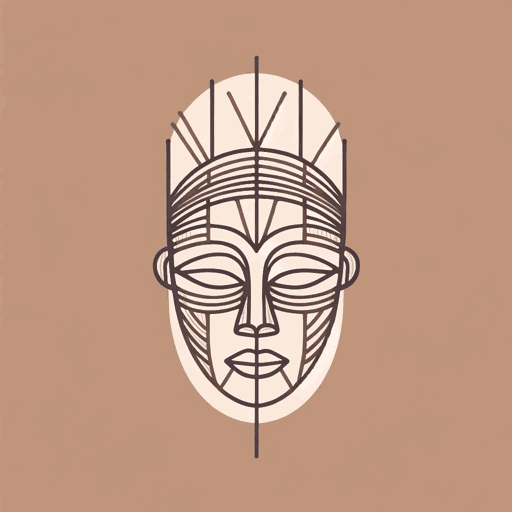
75 pages • 2 hours read
A modern alternative to SparkNotes and CliffsNotes, SuperSummary offers high-quality Study Guides with detailed chapter summaries and analysis of major themes, characters, and more.
Chapter Summaries & Analyses
Chapters 1-3
Chapters 4-6
Chapters 7-9
Chapters 10-13
Chapters 14-16
Chapters 17-19
Chapters 20-22
Chapters 23-25
Character Analysis
Symbols & Motifs
Important Quotes
Essay Topics
Further Reading & Resources
Discussion Questions
Revisit the epigraph of novel, which is an excerpt from William Butler Yeats’ poem, “The Second Coming.” Why did Achebe select this epigraph to introduce his novel? What elements of the novel’s plot and language draw upon the content and emotion of Yeats’ poem?
Manhood and womanhood are emphasized throughout the novel, and not only in Okonkwo’s mind. How do the gendered elements of Ibo society empower and erode the community? Is masculinity a positive force in Okonkwo’s life?
What is the relationship between spiritual and physical life in Things Fall Apart ?

Don't Miss Out!
Access Study Guide Now
Related Titles
By Chinua Achebe
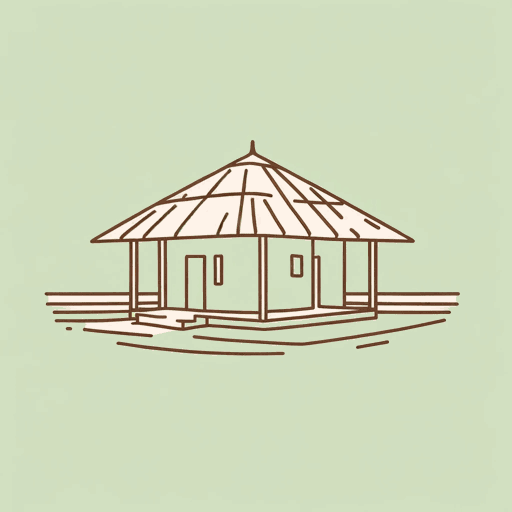
A Man of the People
Chinua Achebe

Anthills Of The Savannah
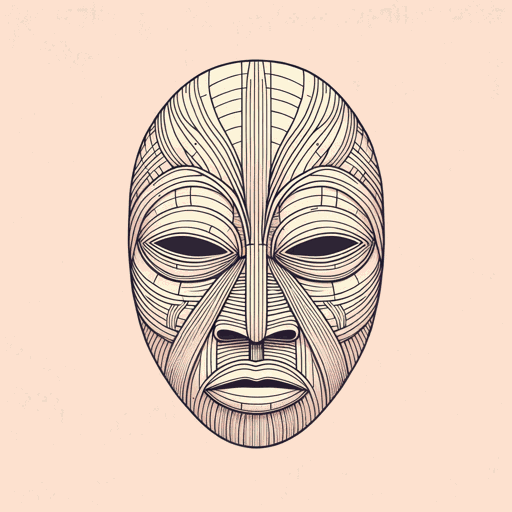
Arrow of God
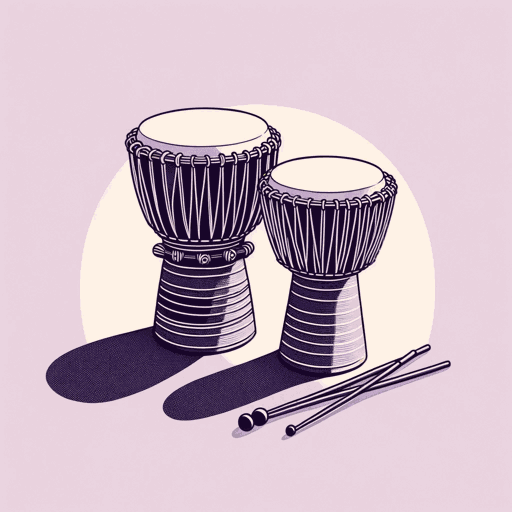
Beware Soul Brother
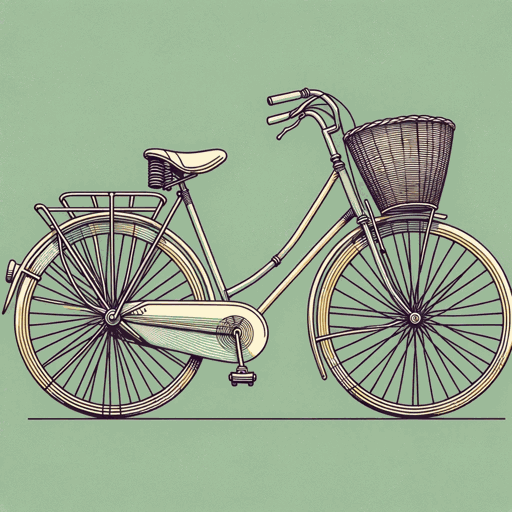
Civil Peace

Dead Men’s Path

Marriage is a Private Affair
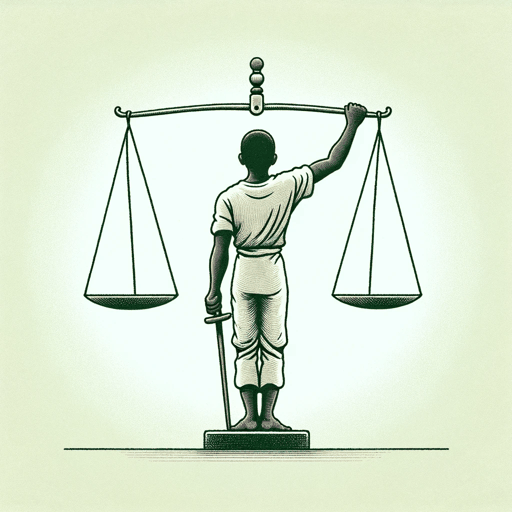
No Longer at Ease

There Was a Country
Featured Collections
African History
View Collection
African Literature
Audio Study Guides
Colonialism & Postcolonialism
Colonialism Unit
Daughters & Sons
Heinemann African Writers Series
You are using an outdated browser. Please upgrade your browser or activate Google Chrome Frame to improve your experience.

Gr. 11 ENG HL T3 W4 Reading and Viewing: • Poetry: The Second Coming • Drama: Macbeth: Act 5 Scenes 8-9 • Novel: Things Fall Apart: Part 3, Chapters 22-23
Reading and Viewing: • Poetry: The Second Coming • Drama: Macbeth: Act 5 Scenes 8-9 • Novel: Things Fall Apart: Part 3, Chapters 22-23
Do you have an educational app, video, ebook, course or eResource?
Contribute to the Western Cape Education Department's ePortal to make a difference.

Home Contact us Terms of Use Privacy Policy Western Cape Government © 2024. All rights reserved.


IMAGES
VIDEO
COMMENTS
Essay Question: Question 1: In a carefully planned essay of 350-400 words (11⁄2-2 pages) in length, critically discuss to what extent the title of the novel is reflected in Okonkwo's life and the lives of the villagers.
QUESTION 6: ESSAY QUESTION - THINGS FALL APART In a carefully planned essay of 350-400 words (1½-2 pages) in length, critically discuss to what extent the title of the novel is reflected in Okonkwo's life and the lives of the villagers. The title is a clear indication of the 'fall' of Okonkwo and of the relatively
SECTION B, you must answer an essay question from SECTION C. SECTION B: NOVEL ANSWER ONLY ON THE NOVEL YOU HAVE STUDIED. ANSWER ANY ONE OF THE FOLLOWING QUESTIONS. QUESTION 6 Things fall apart Essay question 25 marks Page 11 OR QUESTION 7 Things fall apart Contextual question 25 marks Page 12 OR QUESTION 8 Tsotsi
QUESTION 6: THINGS FALL APART - ESSAY QUESTION In a carefully planned essay of 350-400 words (1½-2 pages) in length, critically discuss to what extent Okonkwo's life is determined by his past and traditional beliefs. • This is a guide. Please consider alternative and relevant answers.
QUESTION 6: THINGS FALL APART - ESSAY QUESTION In a carefully planned essay of 300-350 words (1-1 ½ pages) in length, critically discuss to what extent 'things fall apart' because of the conflict between tradition and change. THIS IS A GUIDE. PLEASE CONSIDER ALTERNATIVE AND RELEVANT RESPONSES.
Full Title: Things Fall Apart. When Written: 1957. Where Written: Nigeria. When Published: 1958. Literary Period: Post-colonialism. Genre: Novel / Tragedy. Setting: Pre-colonial Nigeria, 1890s. Climax: Okonkwo's murder of a court messenger. Antagonist: Missionaries and White Government Officials (Reverend Smith and the District Commissioner)
QUESTION 1: POETRY - ESSAY QUESTION Read the poem below and then answer the question that follows. THE SECOND COMING - W.B. Yeats 1 Turning and turning in the widening gyre 2 The falcon cannot hear the falconer; 3 Things fall apart; the centre cannot hold; 4 Mere anarchy is loosed upon the world,
His tragic novel, Things Fall Apart, is one of the most widely-read books in the world. The novel's message about colonialism is echoed and built upon by many of the non-European authors students will read throughout 11th and 12th grade English. In this unit, students will examine how Achebe develops the complex themes of identity, culture ...
Anon HIGH SCHOOL English Home Language Grade 11 TASK 11, PAPER 2: Literature November 2014 Time : 2 Hours Total : 80 Marks INSTRUCTIONS AND INFORMATION 1. ... Say Yes or No. (2) (1) (13) TOTAL SECTION B: 25 SECTION C ( The novel, Things fall apart ) QUESTION 8 : The Essay question (Do this question if you did question 7 in Sect B.) Answer any ...
In the book Things Fall Apart by Chinua Achebe, Okonkwo is used to portray Achebe's own characterization of a tragic hero. Background: A tragic hero... Tragic Hero Chinua Achebe Things Fall Apart. Topics: Chinua Achebe, Domestic violence, Fate vs. Free Will, Igbo people, Masculinity, Poetics, Tragic hero. 27.
Study Guide Questions for Things Fall Apart by Chinua Achebe 1 If you've been struggling with the reading quizzes or just want some extra help following along/keeping track of events in the chapter, use this study guide as you read. You don't necessarily have to answer EVERY question, but answering some of the questions for each chapter will help you process the text.
Things fall apart Essay question 25 11 OR 7. Things fall apart Contextual question 25 11 OR 8. Tsotsi Essay question 25 13 OR 9. Tsotsi Contextual question 25 13 SECTION C: DRAMA ANSWER ONLY ON THE DRAMA YOU HAVE STUDIED. ANSWER ANY ONE OF THE FOLLOWING FOUR QUESTIONS. 10. Macbeth Essay question 25 15 OR 11. Macbeth Contextual question 25 15 OR
QUESTION 6: THINGS FALL APART - ESSAY QUESTION In a carefully planned essay of 300-350 words (1-1 ½ pages) in length, critically discuss to what extent 'things fall apart' because of the conflict between tradition and change. THIS IS A GUIDE. PLEASE CONSIDER ALTERNATIVE AND RELEVANT RESPONSES.
Both Friend and Foil: How the Characterization of Obierika Conveys Human Truths and Social Concerns Anonymous 10th Grade Things Fall Apart. In his novel, Things Fall Apart, Chinua Achebe masterfully uses his characters to convey larger human truths as well as to drive his plot. Things Fall Apart is about the colonialization of a Nigerian tribe ...
What elements of the novel's plot and language draw upon the content and emotion of Yeats' poem? 2. Manhood and womanhood are emphasized throughout the novel, and not only in Okonkwo's mind. How do the gendered elements of Ibo society empower and erode the community? Is masculinity a positive force in Okonkwo's life? 3.
3. Achebe presents details of daily village life in Umuofia, as well as details concerning the Igbo culture. Describe the setting of the novel. 4. What is chi? Explain the importance of chi in shaping Okonkwo's destiny. 5. Obierika is a foil for Okonkwo. That is, when compared to Okonkwo, the contrast between the two characters emphasizes the ...
Things fall apart Contextual question 25 10 OR 8. Tsotsi Essay question 25 12 OR 9. Tsotsi Contextual question 25 13 SECTION C: DRAMA ANSWER ONLY ON THE DRAMA YOU HAVE STUDIED. ANSWER ANY ONE OF THE FOLLOWING FOUR QUESTIONS. 10. Macbeth Essay question 25 16 OR 11. Macbeth Contextual question 25 16 OR 12. The Merchant of Venice Essay question 25 ...
Reading and Viewing: • Poetry: The Second Coming • Drama: Macbeth: Act 5 Scenes 8-9 • Novel: Things Fall Apart: Part 3, Chapters 22-23 Gr. 11 ENG HL T3 W4 Reading and Viewing: • Poetry: The Second Coming • Drama: Macbeth: Act 5 Scenes 8-9 • Novel: Things Fall Apart: Part 3, Chapters 22-23 | WCED ePortal